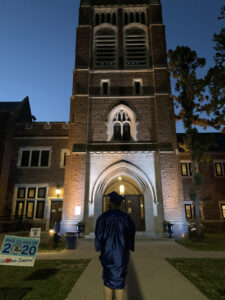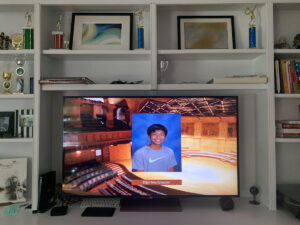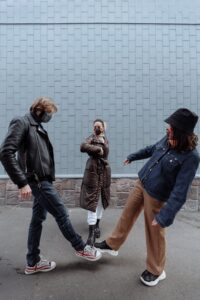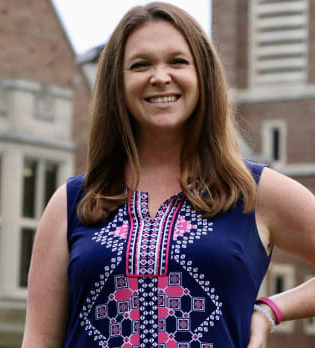 “Don’t stop, believing” is blaring through the speakers. It is the traditional last song of prom at Princeton High School. I look around. Normally I am in the middle of the dance floor, surrounded by our Seniors and the brave staff who come out for the final dance number. This year I am in my kitchen on Zoom at 11:00pm with 150 Seniors all belting out the Journey lyrics. Students are laughing and singing. Forgetting lyrics without a care. There was no limo. No hair or nails. This 4 minute and 11 second moment showed me something about our students.
“Don’t stop, believing” is blaring through the speakers. It is the traditional last song of prom at Princeton High School. I look around. Normally I am in the middle of the dance floor, surrounded by our Seniors and the brave staff who come out for the final dance number. This year I am in my kitchen on Zoom at 11:00pm with 150 Seniors all belting out the Journey lyrics. Students are laughing and singing. Forgetting lyrics without a care. There was no limo. No hair or nails. This 4 minute and 11 second moment showed me something about our students.
The school year was progressing as it does when on March 13th everything changed. Given a day or two to pivot, educators across the state scrambled to figure out how they were going to deliver curriculum remotely. Students felt the same pressure. Over the loudspeaker they were asked to clean out their lockers as we were going to be remote “for two weeks or more.” Two weeks became three months and Princeton Schools, like much of the rest of the state, did not open their doors to students again until the Fall.
 Looking through the eyes of a 6th grader, the student finished their last year of elementary school remote and began middle school in the same fashion. Students were sent home from Princeton University, and then told that they would also be all remote all fall. High School students were graduated in person, but one by one in the shadow of the tower. Ultimately watching the final graduation program on their laptops in their homes.
Looking through the eyes of a 6th grader, the student finished their last year of elementary school remote and began middle school in the same fashion. Students were sent home from Princeton University, and then told that they would also be all remote all fall. High School students were graduated in person, but one by one in the shadow of the tower. Ultimately watching the final graduation program on their laptops in their homes.
 Every school year is filled with ups and downs, highs and lows, happiness and sometimes tears. This year was no different in that regard. What was different was the glaring social emotional component of schools that are hard to replicate remotely. How do you capture “hallway chatter”? What does lunch look like? How does a parent work and care for their child who is in a remote learning environment? When will I see my friends, colleagues, boss again? There is a very natural fear of the unknown. People, especially children, benefit from structure and routine. Don’t get me wrong, it is lovely to be spontaneous but as a species (and if you are a Maslow fan) humans need shelter, food, and care. Many aspects of this pandemic put these core foundational needs at risk.
Every school year is filled with ups and downs, highs and lows, happiness and sometimes tears. This year was no different in that regard. What was different was the glaring social emotional component of schools that are hard to replicate remotely. How do you capture “hallway chatter”? What does lunch look like? How does a parent work and care for their child who is in a remote learning environment? When will I see my friends, colleagues, boss again? There is a very natural fear of the unknown. People, especially children, benefit from structure and routine. Don’t get me wrong, it is lovely to be spontaneous but as a species (and if you are a Maslow fan) humans need shelter, food, and care. Many aspects of this pandemic put these core foundational needs at risk.
Having said that, the one thing as the Supervisor of School Counseling that I saw over and over and over again was the ability of our students to try and make things work. Okay they can’t talk to their friends in the hallways, but we can during our zoom breakout sessions. We can’t eat lunch in the cafeteria, but we can eat on the lawn six feet apart. Parents created groups to help with childcare, schools tried to cohort siblings to build in childcare. People returned to the building to draw lines in the hallways, signs marking six feet apart, retrofitting desks with plexiglass and a host of other things. What I saw on that first day at Community Park Elementary School was students and parents wearing masks, getting temperatures taken, and not one temper tantrum entering the building (ask any elementary education professional to fully grasp how amazing this was).
Resiliency is defined as “the process of adapting well in the face of adversity, trauma, tragedy, threats, or significant source of stress” (American Psychological Association, 2012). When I think of resilience as a concept, I understand that life has changes, both good and bad, but what really defines us is how we respond to these changes. There is no doubt that the pandemic this year changed everything we knew about education. What it didn’t change was what we know about people.
 The students in Princeton Public Schools, and I think across the country at all grade levels, showed such astonishing resilience through this. An incredible example of this was seen at Princeton Unified Middle School’s promotion ceremony. With time running out, and no “in person” large gathering permissions on the horizon, a group of Princeton High School students volunteered to assist with the production of the event. Meeting with myself and Mr. Burr at night and over the weekends they helped make sense of photos, video, speeches, and music for the production. These students gave up their time to help their 8th grade student colleagues. The result? Our 8th grade promotion was not in person, but together we hosted a watch party via zoom of a wonderful celebration of our 8th graders. And we can thank some High School students for that. They quickly adapted, assisted, and ultimately donated their time to care for their fellow students. The 8th grade students met it with the same resilience. They smiled, laughed, submitted memories and pictures, and in the end… were okay.
The students in Princeton Public Schools, and I think across the country at all grade levels, showed such astonishing resilience through this. An incredible example of this was seen at Princeton Unified Middle School’s promotion ceremony. With time running out, and no “in person” large gathering permissions on the horizon, a group of Princeton High School students volunteered to assist with the production of the event. Meeting with myself and Mr. Burr at night and over the weekends they helped make sense of photos, video, speeches, and music for the production. These students gave up their time to help their 8th grade student colleagues. The result? Our 8th grade promotion was not in person, but together we hosted a watch party via zoom of a wonderful celebration of our 8th graders. And we can thank some High School students for that. They quickly adapted, assisted, and ultimately donated their time to care for their fellow students. The 8th grade students met it with the same resilience. They smiled, laughed, submitted memories and pictures, and in the end… were okay.
 Please don’t get me wrong, this is not the way things should be. There will be lasting effects of this pandemic. But so much has focused on the negatives, and our students have shown me so many positives and I wanted to share those with you. The kindergarten student who proudly zooms their show and tell. The student who shares a bedroom with a sibling and learned how to put a virtual background up for some privacy. The student in the community service group that manages their own work and tutoring a middle school student. The student who performed in a virtual concert. The student who handmade masks for first responders. The student who got a job at a grocery store and became an essential worker. The student who had a socially responsible playdate with a friend this summer after not seeing them for months. The student who corrects every mistake I make on weekly trivia. The student who was singing at the top of her lungs to Journey’s “Don’t stop believing”.
Please don’t get me wrong, this is not the way things should be. There will be lasting effects of this pandemic. But so much has focused on the negatives, and our students have shown me so many positives and I wanted to share those with you. The kindergarten student who proudly zooms their show and tell. The student who shares a bedroom with a sibling and learned how to put a virtual background up for some privacy. The student in the community service group that manages their own work and tutoring a middle school student. The student who performed in a virtual concert. The student who handmade masks for first responders. The student who got a job at a grocery store and became an essential worker. The student who had a socially responsible playdate with a friend this summer after not seeing them for months. The student who corrects every mistake I make on weekly trivia. The student who was singing at the top of her lungs to Journey’s “Don’t stop believing”.
See, I never stop believing in the strength of our children. And they never stop impressing me. Fred Rogers said, “Look for the helpers”. I think I found them.

Kristina Donovan earned her Ph.D. in Counselor Education and Supervision. Dr. Donovan is the Supervisor for School Counseling for the Princeton Public Schools K – 12 and was a school counselor in Princeton for many years working with students grades 9 – 12. She is also the program director for School Counseling at Georgian Court University and a part-time lecturer at Rutgers University. Dr. Donovan enjoys spending time with her two middle school children, husband, dog, and three chickens. Not always in that order.
